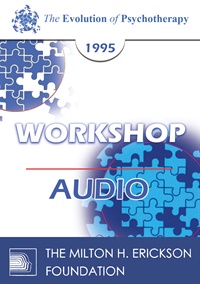EP95 Workshop 26 - The Use of Themes and Belief Systems in Therapy - Peggy Papp, ACSW
- Average Rating:
- Not yet rated
- Topic Areas:
- Workshops | Belief Systems | Psychotherapy | Family Therapy
- Categories:
- Evolution of Psychotherapy | Evolution of Psychotherapy 1995 | Pioneers in Couples and Family Therapy
- Faculty:
- Peggy Papp, ACSW
- Duration:
- 2 Hours 38 Minutes
- Format:
- Audio Only
- Original Program Date:
- Dec 14, 1995
- License:
- Never Expires.
Description
Syllabus Description: This workshop focuses on identifying core beliefs and themes in couples and families that are constraining change. Creative use of the interview and interventions, including symbols, metaphors, language, fantasies and rituals to point a direction for change will be demonstrated.
Educational Objectives:
- To describe three ways of developing a theme.
- To describe two ways of challenging an entrenched belief system.
*Sessions may be edited for content and to preserve confidentiality*
Credits
Handouts
| Timestamped Transcript (1.9 MB) | 55 Pages | Available after Purchase |
| Ericksonian Learning Snapshot (251.5 KB) | 2 Pages | Available after Purchase |
Faculty

Peggy Papp, ACSW Related Seminars and Products
PEGGY PAPP, A.C.S.W., is a therapist in private practice and Co-Director of the Brief Therapy Project at the Ackerman Institute for Family Therapy in New York City. She is recipient of the lifetime achievement award from the American Family Therapy Association and the award for distinguished contribution to Marital Family Therapy from the American Association for Marital and Family Therapy. Her latest book is Couples On the Fault Line.


